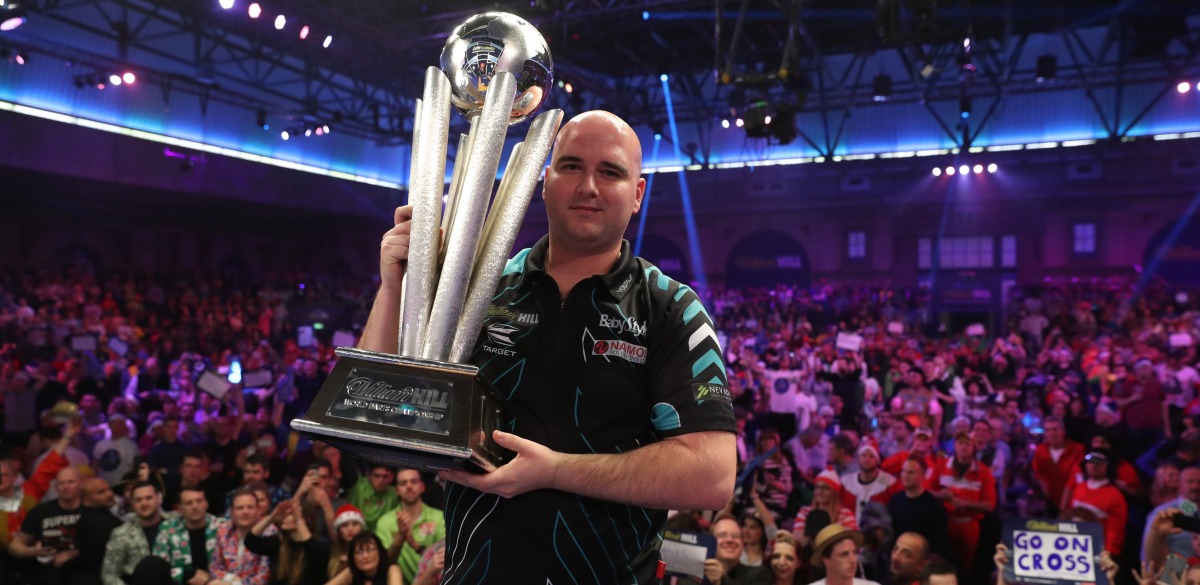
Christopher Kempf, the stats analyst of the PDC, looks at which players have most to gain and lose in ranking money at the 2019/2020 William Hill World Darts Championship.
The 2019/2020 World Championship represents a major turning point in the career of Rob Cross, the debutant who ruled the world in January 2018.
Two years on, Cross must defend the £400,000 winners' prize, which was (at the time) the largest single prize ever won by a darts player, even after taking inflation into account.
To avoid watching £200,000 or more disappear from his total income on the Order of Merit, he must win the World Championship again - there are no alternatives.
Even after having won the World Matchplay and the European Championship, the share of his World Championship winnings at stake this year represents almost 40% of the total. A loss at any stage of the tournament will mean that his position as world number two, which he has now held for more than a year, will be vulnerable.

There can be no possible change at the top of the rankings at the end of the event as Michael van Gerwen's place as world number one is secure for at least another year, owing to his lead of over half a million pounds on the Order of Merit over Cross.
Furthermore, his semi-final loss to Cross in 2018 also means that less than 5% of his ranking money is at risk in this year's World Championship.
In the absolute worst case scenario for MvG, he will begin January 2020 more than £200,000 ahead of Gerwyn Price, even if Price becomes World Champion.
However, if MvG wins the tournament (as the bookmakers expect him to do), he will reach the highest level of income ever attained on the two-year Order of Merit.
Such a coup would substantially increase the probability of MvG, by the end of 2023, having spent an entire decade atop the Order of Merit.
While the general order of the top players remains mostly unchanged, substantial movement will occur among the lower-ranked seeds.
Seven of the seeded players in this year's World Championship did not qualify for the 2017/2018 World Championship, meaning their Order of Merit level can only increase.

This will be to the dramatic benefit of Nathan Aspinall more than any other - after losing his tour card at the end of 2017/2018, he has ascended to be 12th seed on the back of a UK Open title and a semi-final appearance at Alexandra Palace.
If he were to make it back-to-back semi-finals this year, he could potentially vault himself into the top eight.
Consider also Glen Durrant, who is in his first year as a PDC tour card holder. He is a World Championship semi-final away from the top 16, with a full year of undiminished ranking earnings ahead of him to look forward to.
The Order of Merit is a "rolling" system, and it rolls on apace, without any regard for the players if they've been injured or if they've had a tough year maintaining their form.

This will affect no player more than Jamie Lewis, current world number 34, who has not qualified for any televised events since March and fell short in his last-chance attempt to win at the Tour Card Holders' qualifier for the World Championship.
Two years ago, the qualifier was kinder to him - he won just enough to secure a spot in the preliminary round. Lewis then went on a legendary spree, playing the best darts of his life match after match, even averaging 107.27 in a dazzling 4-2 victory over Peter Wright.
He won the first set of his semi-final match against Phil Taylor, before Taylor proceeded to win every time his opponent was positioned on 2 legs, throwing for the set.
However the £85,000 prize money was enough to secure a place within the top 32 for the next two years. Time has now run out for Lewis, who will lose 54% of his Order of Merit income - the largest single drop, in percentage terms, since the introduction of the Order of Merit.
He is, however, unlikely to lose his tour card, barring an improbable sequence of wins by players currently below him on the Order of Merit.
The impact that the World Championship has on the Order of Merit is massively larger than that of any other tournament.
The 2019/2020 event is also the second to be held after the tournament expanded from 72 players to 96, making it the last event in which large numbers of players will be able to accrete ranking money without having to worry about defending earnings from two years prior.
From 2020/2021 onward, qualifying for the World Championship will likely mean the difference for many players between another year as a tour card holder and a dreaded trip to Q School.